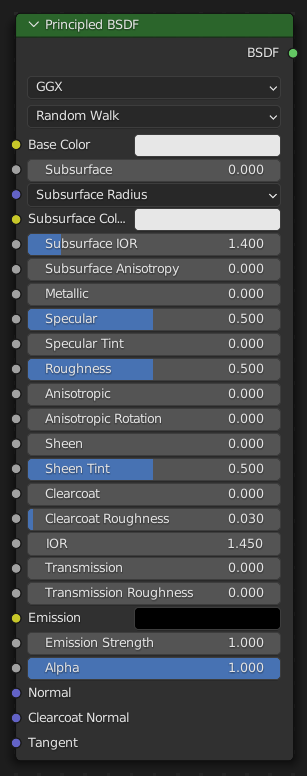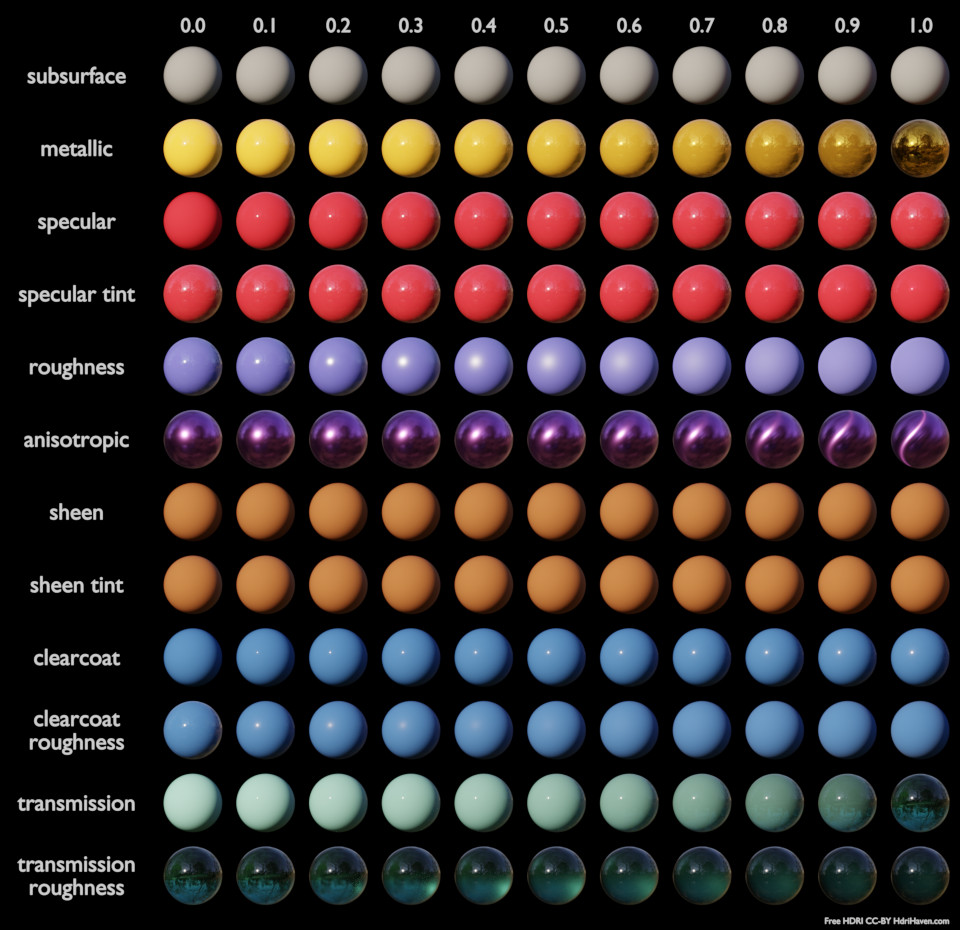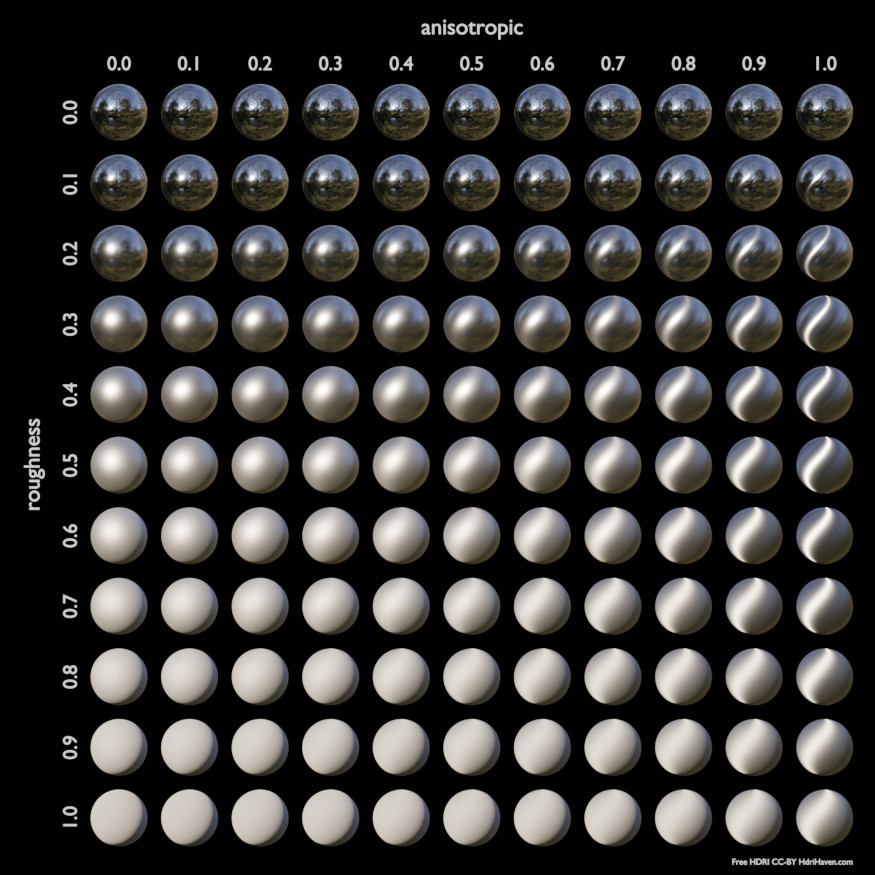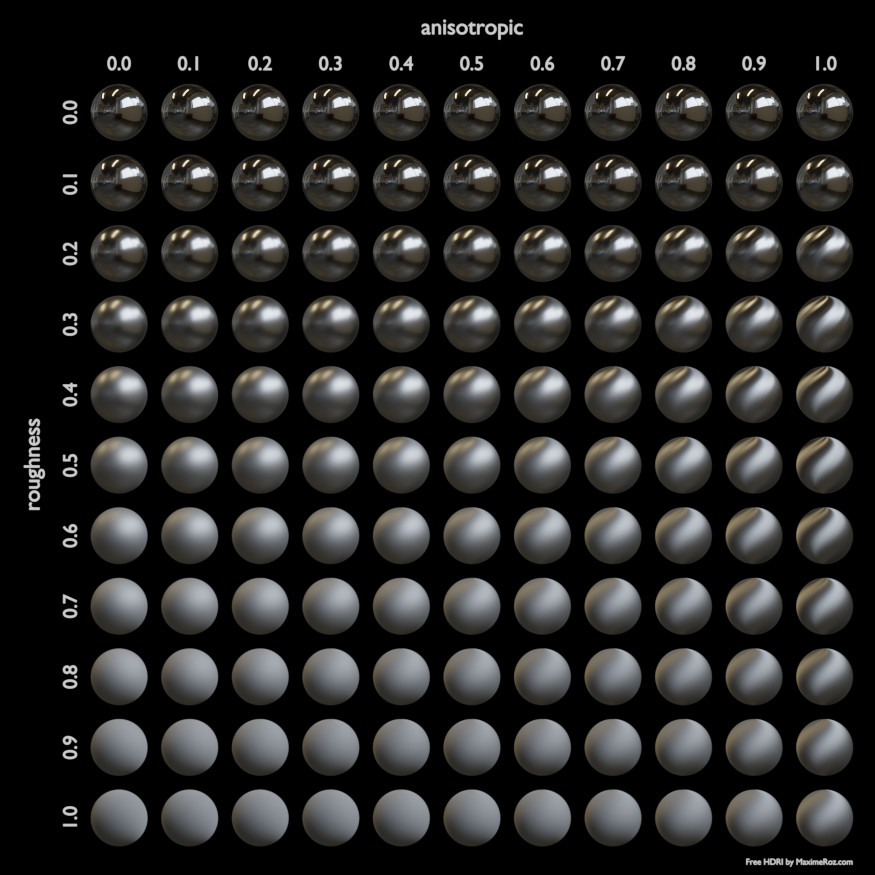Principled BSDF(プリンシプルBSDF)

The Principled BSDF that combines multiple layers into a single easy to use node. It is based on the Disney principled model also known as the "PBR" shader, making it compatible with other software such as Pixar's Renderman® and Unreal Engine®. Image textures painted or baked from software like Substance Painter® may be directly linked to the corresponding parameters in this shader.
This "Uber" shader includes multiple layers to create a wide variety of materials. The base layer is a user controlled mix between diffuse, metal, subsurface scattering and transmission. On top of that there is a specular layer, sheen layer and clearcoat layer.
注釈
The emphasis on compatibility with other software means that it interprets certain input parameters differently from older Blender nodes.
入力
- Base Color
Diffuse or metal surface color.
- Subsurface
Mix between diffuse and subsurface scattering. Rather than being a simple mix between Diffuse and Subsurface Scattering, it acts as a multiplier for the Subsurface Radius.
- Subsurface Radius
光がサーフェスの下を散乱する平均距離。半径が大きいほど、光が影に流れ込み、オブジェクトを通過するため、柔らかな外観になります。散乱距離はRGBチャネルに対して個別に指定され、赤い光がより深く散乱する皮膚などのマテリアルをレンダリングします。X、Y、Zの値は、それぞれR、G、Bの値にマッピングされます。
- Subsurface Color
Subsurface scattering base color.
- Subsurface IOR Cycles Only
Index of refraction for Subsurface Scattering.
- Subsurface Anisotropy Cycles Only
Controls the directionality of subsurface scattering.
- Metallic
Blends between a non-metallic and metallic material model. A value of 1.0 gives a fully specular reflection tinted with the base color, without diffuse reflection or transmission. At 0.0 the material consists of a diffuse or transmissive base layer, with a specular reflection layer on top.
- Specular(スペキュラー)
Amount of dielectric specular reflection. Specifies facing (along normal) reflectivity in the most common 0 - 8% range.
ヒント
To compute this value for a realistic material with a known index of refraction, you may use this special case of the Fresnel formula:
例:
water: ior = 1.33, specular = 0.25
glass: ior = 1.5, specular = 0.5
diamond: ior = 2.417, specular = 2.15
Since materials with reflectivity above 8% do exist, the field allows values above 1.
- Specular Tint
Tints the facing specular reflection using the base color, while glancing reflection remains white.
Normal dielectrics have colorless reflection, so this parameter is not technically physically correct and is provided for faking the appearance of materials with complex surface structure.
- Roughness
サーフェス反射とスペキュラー反射の表面のマイクロファセットラフネス(ミクロな表面の粗さ)を指定します。
- Anisotropic Cycles Only
Amount of anisotropy for specular reflection. Higher values give elongated highlights along the tangent direction; negative values give highlights shaped perpendicular to the tangent direction.
- Anisotropic Rotation Cycles Only
Rotates the direction of anisotropy, with 1.0 going full circle.
ヒント
Compared to the Anisotropic BSDF node, the direction of highlight elongation is rotated by 90°. Add 0.25 to the value to correct.
- Sheen
Amount of soft velvet like reflection near edges, for simulating materials such as cloth.
- Sheen Tint
Mix between white and using base color for sheen reflection.
- Clearcoat
他の要素の最上部にあたる、追加の白いスペキュラ階層。自動車の塗装などのマテリアルに適します。
- Clearcoat Roughness:
Roughness of clearcoat specular.
- IOR
Index of refraction for transmission.
- Transmission
Mix between fully opaque surface at zero and fully glass like transmission at one.
- Transmission Roughness Cycles Only
With GGX distribution controls roughness used for transmitted light.
- Emission(放射)
Light emission from the surface, like the Emission shader.
- Emission Strength (放射の強さ)
Strength of the emitted light. A value of 1.0 will ensure that the object in the image has the exact same color as the Emission Color, i.e. make it 'shadeless'.
- Alpha(アルファ)
Controls the transparency of the surface, with 1.0 fully opaque. Usually linked to the Alpha output of an Image Texture node.
- Normal(ノーマル)
ベース階層の法線の制御。
- Clearcoat Normal
Controls the normals of the Clearcoat layer.
- Tangent(タンジェント)
Controls the tangent for the Anisotropic layer.
Properties(プロパティ)
- Distribution(分布)
使用するマイクロファセット分布。
- GGX
A method that is faster than Multiple-scattering GGX but is less physically accurate. Selecting it enables the Transmission Roughness input.
- Multiple-scattering GGX
Takes multiple bounce (scattering) events between microfacets into account. This gives a more energy conserving results, which would otherwise be visible as excessive darkening.
- Subsurface Method
サブサーフェススキャタリングをシミュレートするレンダリング方法。
注釈
Eevee does use not support the Random Walk methods.
- Christensen-Burley
An approximation to physically-based volume scattering. This method is less accurate than Random Walk however, in some situations this method will resolve noise faster.
- Random Walk (Fixed Radius)
Provides accurate results for thin and curved objects. Random Walk uses true volumetric scattering inside the mesh, which means that it works best for closed meshes. Overlapping faces and holes in the mesh can cause problems.
- Random Walk
Behaves similarly to Random Walk (Fixed Radius) but modulates the Subsurface Radius based on the Color, Subsurface Anisotropy, and Subsurface IOR. This method thereby attempts to retain greater surface detail and color than Random Walk (Fixed Radius).
出力
- BSDF
標準シェーダー出力。
例
Below are some examples of how all the Principled BSDF's parameters interact with each other.


